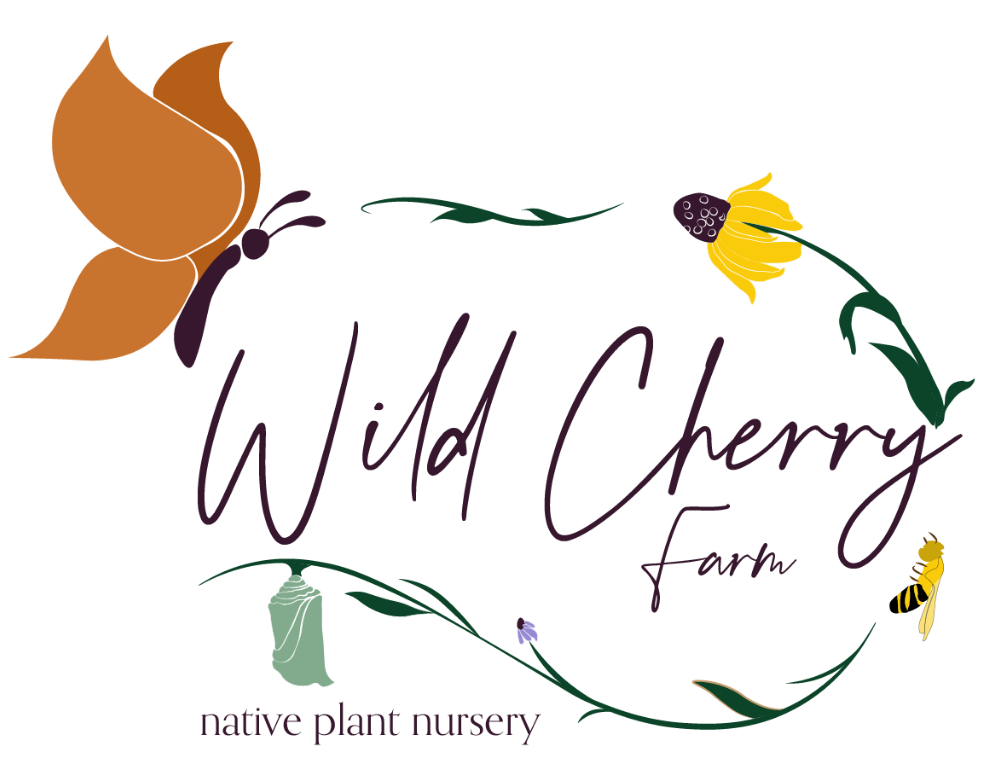New England Aster (Symphyotrichum novae-angliae)
New England Asters are one of those great garden plants that serve as both a host plant and a nectar plant for butterflies. It is the host plant for the Pearl Crescent butterfly and 43 other species of butterflies and moths in our area (illnoiswildflower.info) and it is the host to 36 different specialist bees (Holm, 2017) (Johnson and Colla, 2023)! It is an excellent late-season nectar source for bees and butterflies, especially those that are getting ready to migrate! New England Aster is recommended as a monarch nectar source (Xerces.org) and a preferred pollinator plant by the Xerces Society (Xerces.org). If you are lucky, this plant will do some self-seeding. If you do not want this, just remove seed heads when they are ripe.
Photo credit: John Blair (2)
New England Asters are one of those great garden plants that serve as both a host plant and a nectar plant for butterflies. It is the host plant for the Pearl Crescent butterfly and 43 other species of butterflies and moths in our area (illnoiswildflower.info) and it is the host to 36 different specialist bees (Holm, 2017) (Johnson and Colla, 2023)! It is an excellent late-season nectar source for bees and butterflies, especially those that are getting ready to migrate! New England Aster is recommended as a monarch nectar source (Xerces.org) and a preferred pollinator plant by the Xerces Society (Xerces.org). If you are lucky, this plant will do some self-seeding. If you do not want this, just remove seed heads when they are ripe.
Photo credit: John Blair (2)
New England Asters are one of those great garden plants that serve as both a host plant and a nectar plant for butterflies. It is the host plant for the Pearl Crescent butterfly and 43 other species of butterflies and moths in our area (illnoiswildflower.info) and it is the host to 36 different specialist bees (Holm, 2017) (Johnson and Colla, 2023)! It is an excellent late-season nectar source for bees and butterflies, especially those that are getting ready to migrate! New England Aster is recommended as a monarch nectar source (Xerces.org) and a preferred pollinator plant by the Xerces Society (Xerces.org). If you are lucky, this plant will do some self-seeding. If you do not want this, just remove seed heads when they are ripe.
Photo credit: John Blair (2)
Life Cycle: Perennial
Sun Exposure: Full, partial
Soil Moisture: Wet, Medium, Medium-Dry
Height: 5 feet
Plant Spacing: 2-3 feet
Bloom Time: August - October
Bloom Color: Purple flower with an orange-yellow center.
Advantages: Pollinator Favorite, Bird Favorite, and Great landscaping plant, but can be very vigorous
Host Plant: Pearl Crescent and 43 other species of butterflies and moths in our area (illnoiswildflower.info)
Specialist Bee: Andrena asteris, A. aliciae, A. simplex, A. asteroides, A. canadensis, A. chromotricha, A. hirticincta, A nubecula, A. placata, A. simplex, Calliopsis coloradensis, Colletes americanus, C. compactus, C. rufocinctus, C. simulans, C. speculiferus, Melissodes dentiventris, M. boltoniae, M. confuses, M. coreopsis, M. dentiventris, M. druriellus, M. illatus, M. lustrus, M. menuachus, M. microstictus, M. niveus, M. semilupinus, M. subagilis, M. subillatus, M. tinctus, M. trinodis, Perdita octomaculata, P. albipinnis, Pseudopanurgus aestivalis, P. andrenoides, P. compositarum, Megachile inimical, Anthophorula asteris, and Dianthidium simile (Holm, 2017) (Johnson and Colla, 2023)
Complementary Plants: Riddell’s Goldenrod, Cup Plant, Bottle Gentian, Common Boneset, Asters, Big Bluestem
Resource: Holm, Heather. Bees: An Identification and Native Plant Forage Guide. Pollination Press LLC, 2017
Resource: Johnson, Lorraine, and Sheila Colla. A Northern Gardener’s Guide to Native Plants and Pollinators: Creating Habitat in the Northeast, Great Lakes, and Upper Midwest. Island Press, 2023









